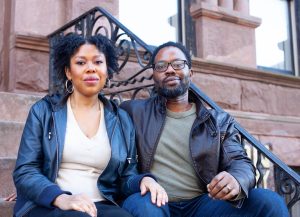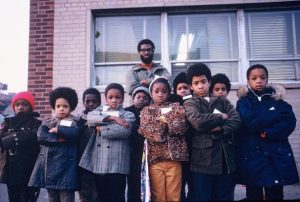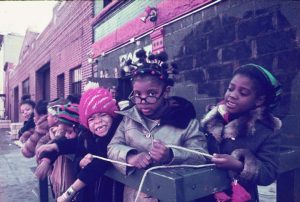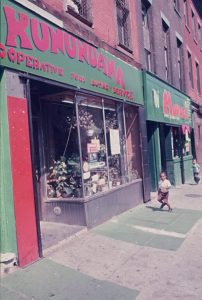The Sun Rises in The East

Black self-determination. Institution building. Creating an independent Black nation in the heart of Central Brooklyn. These are just some of the ideologies that were embodied by The East, a pan-African cultural organization founded in 1969 by teens and young adults in the Brooklyn neighborhood of Bedford-Stuyvesant. It’s a story that’s been captured in the recently released documentary, The Sun Rises In the East. Created by the filmmaking team of Tayo Giwa and Cynthia Gordy Giwa, this 58-minute project traces the movement’s origins, history and impact that continues to be felt to this day. Giwa and Gordy Giwa, the founders of Black-Owned Brooklyn (BOB), a publication and Instagram account documenting local Black business, history and culture, were inspired to share this tale after The East popped up on their radar while working on a feature for their aforementioned main gig.
“The initial idea to do a film on The East stemmed from a story we were doing in Black-Owned Brooklyn about the International African Arts Festival, which we had gone to and enjoyed, but we didn’t know that much about its history,” Gordy Giwa explained. “In researching for that piece, we discovered it was founded as a fundraiser for a school called the Uhuru Sasa Shule founded by this broader institution called The East. We kind of went down the rabbit hole of finding out more about them just through writing this story about the International African Arts Festival. That was one prong of all of the things they built. The fact that we had never heard of The East, its influence and all the contributions they made struck us as an under-sung story that we wanted to get out to a wider audience. We wanted to do it in a way that was bigger than an article for Black-Owned Brooklyn. It deserved a more compelling treatment.”

“I think we viewed the film as an extension of the historical and cultural documentation that we do in Black-Owned Brooklyn,” Giwa added. “We wrote a story about The East in Black-Owned Brooklyn. As we continued to speak with people in the community—business owners and others—it became obvious how The East was still here. It would bubble up in conversation when people would talk about their experience going to programs organized by the East. Or they’d talk about how they taught in The East or their parents taught in The East. We started seeing connections that were really under the surface. This organization may have hit its pinnacle in the ‘70s and ‘80s, but its impact is still very much alive in this community.”
The seeds for The East were planted upon the dismantling of the New York City 1968 community control experiment that gave members of the predominantly Black Central Brooklyn neighborhoods of Ocean Hill-Brownsville decision-making power in their children’s education, from school curriculum to the hiring of teachers. Backlash from the largely white United Federation of Teachers (UFT) that resulted in a 36-day citywide teachers’ strike in September not only shut down the community control experiment, but spurred a group of young Black teachers and recent high school graduates to create their own institutions outside of the system. The foundation for what became The East was the establishing of the Uhuru Sasa Shule, which is Kiswahili for Freedom Now School. Spearheaded by the late educator/activist Jitu Weusi, The East was also responsible for a number of other institutions ranging from Black News newspaper, East Kitchen and Caterers and the Kununuana Food Cooperative to East Publishers, Akiba Mkuu Bookstore, the East Records label and East Jazz Club. For both documentarians, Weusi not surprisingly looms large throughout the film.

“I think when we came to this project, we really didn’t have a set agenda or way to tell it,” Giwa said. “The fact that the film very much became about Jitu in some ways reflected what people told us. Very sincerely, people told us what he meant to them and his inspiration for this movement. It was powerful and really struck us that this was someone who was a significant person and his history was something that was very important for us to resurrect. Something his daughter [Kweli Campbell] said in the film about his being her best friend. For us hearing that, it was really the measure of the man. Great men do amazing things in this world, but their kids are not necessarily singing their praises in that way. As someone who was such a community figure, yet had his daughter speak in that way, it really showed that this was someone who had his bearings in terms of his family first.”
While The East ceased to exist by the mid-‘80s, its legacy lives on most notably through the annual International African Arts Festival. The example of potent community activism was a major takeaway for Giwa and Gordy Giwa once the film wrapped.
“One way to look at The East is as an inspiration,” Giwa said. “It’s quite extraordinary when you look at these teenagers and young people working together and what they built having an impact 50 years later. People always ask what they can do to make their community better and you look at The East and how they really worked to address the needs of their community, but they never asked anyone for permission or needed permission to do that work. They just did it and took it upon themselves. They didn’t necessarily have the official credentials, but they sort of had belief itself. And they had belief in hard work. That combined, with their collective ambition—it’s a lesson of how much you can achieve that will last for generations.”

“Hopefully, that’s something young people who are organizing today can look to as an example of what you actually can do even if you don’t have experience in all those different things,” Gordy Giwa added. “Together you can do so much.”
On Feb. 8 at 11:30 a.m. in the Edison O. Jackson Auditorium, moderator Dr. Brenda Greene will host a screening of The Sun Rises in the East followed by a panel discussion featuring filmmakers Tayo Giwa and Cynthia Gordy along with guest panelists Malika Iman and Adeyemi Bandele, who will discuss how The East built an independent Black nation in the heart of Central Brooklyn. View Event Details
Visit BlackownedBKLYN on Instagram to find out more about Black-Owned Brooklyn.

